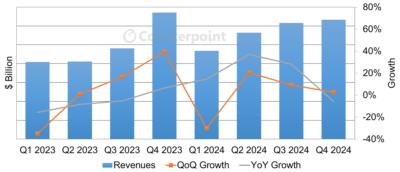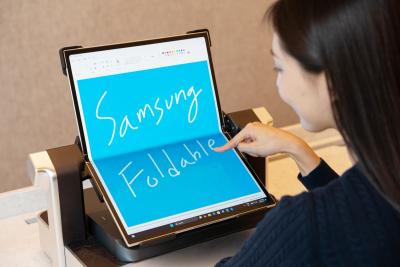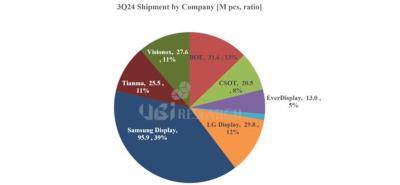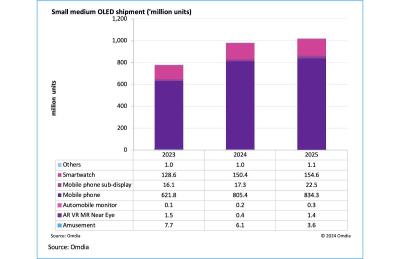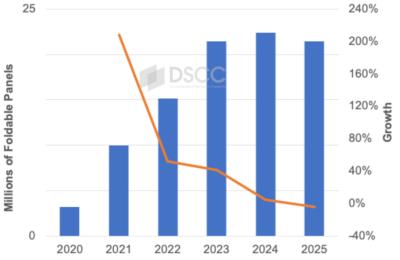OLED Smartphones - introduction and industry news
What is an OLED display?
An OLED display uses a new technology called OLED (Organic Light Emitting Diodes). OLED screens are brighter, more efficient, thinner and feature better refresh rates and contrast than LCD or Plasma.
OLEDs are made by placing thin films of organic (carbon based) materials between two conductors. When an electrical current is applied, a bright light is emitted. Since the OLED materials emit light, a backlight is not required (unlike LCDs).
OLEDs in mobile phones
Mobile phones that boast OLED screens are rapidly becoming more prevalent, with over 500 million AMOLED screens annually - mostly to satisfy demand from mobile phones. Samsung has been using AMOLEDs in its high-end phones for many years, and most phone makers are also adopting OLED displays (including Apple, LG, Xiaomi, Huawei, Oppo, Vivo, Lenovo, Motorola, and others).
OLED displays are advancing quickly, and today smartphone AMOLED displays outperform LCDs in all parameters - except the price which is still at a premium.
For a complete list of smartphones and mobile phones with OLED displays, click here.
Further reading
Counterpoint: OLED shipments grew 28% in Q3 2024, driven by higher demand for smartphones, TVs and laptops
Counterpoint (DSCC) says that OLED panel revenues increased 28% in Q3 2024, and the company expects revenues in all of 2024 to grow 16% from 2023, mainly driven by growth in smartphones, TVs and IT applications.
In terms of unit shipments, Q3 2024 saw a 34% increase from Q3 2023. Shipments of OLED smartphone panels increased 43% from 2023 (and 24% in revenues). OLED TV shipments grew 48% in the quarter (36% increase in revenue). The largest increase came from laptop OLED panels that more than doubled (108%) in shipments in Q3.
Samsung Display shows new OLED technologies at CES 2025
Samsung Display is set to show new OLED technologies at CES 2025, including new foldable display, rollable ones, automotive displays, next-gen QD-OLED panels and more.
So first up, Samsung will be showing a 18.1 foldable OLED display (which it says is the world's largest). This panel is suitable for IT devices - to enable devices that combine tablet, laptop and monitor devices into one. When folded, this display is 13.1" in size.
India inaugurates a new AMOLED research center at IIT Madras
The Indian Institute of Technology Madras (IIT Madras) has inaugurated a new research center dedicated for the development of AMOLED technologies. The new AMOLED Research Centre (ARC) is a national centre of excellent that is funded by the Government's Ministry of Electronics and Information Technology (MeitY), by the Indian Defence Research and Development Organisation (DRDO), and Tata Sons.
The goal of this new center is to help India's display manufacturing industry. It will focus on AMOLED displays for wearables, smartphones, and tablets. Researchers at the ARC will also engage in research into OLED TVs, OLED lighting and OPVs.
UBI: OLED shipments increase in Q3 2024, mostly driven by increased shipments by LG Display and Everdisplay
UBI Research says that shipments of small OLED panels rose to 247 million units, up 7.8% from the previous quarter (and up 32.6% from Q3 2023), mainly driven by increase in shipments by LG Display and Everdisplay.
LG Display shipped 17.6 million smartphones panels in the quarter, up 64% from Q2 and 12.2 million wearable OLED panels (up 147%) - thanks to strong shipments to Apple. In total LGD's AMOLED shipments grew 74% quarter to quarter, and 115% from last year. UBI expects LGD to continue and increase its shipments in Q4. The company is almost at full capacity and UBI says the company may decide to expand the capacity at one of its existing 6-Gen fabs.
Omdia: Over 1 billion AMOLED panels will ship in 2025
Omdia released its latest OLED market forecasts, and the company says the small/medium (1-inch to 8-inch) OLED shipments will surpass one billion for the first time in 2025.
In the smartphone market, Omdia says that there has been significant growth, mainly driven by Chinese OLED producers (BOE, CSoT, Visionox, Tianma and Everdisplay). In addition to the growth in smartphone displays, OLED are expanding into new applications, including AR/VR and automotive displays.
DSCC: The foldable smartphone market will stagnate in 2024 and 2025, fast growth will continue in 2026
According to DSCC, the foldable smartphone display market has declined for the first time in Q3 2024, and the company sees the market entering a flat state in 2024 and 2025. The market has grown fast (at least 40% per year) since 2019, but according to DSCC it will grow only 5% in 2025 and will decline by 4% in 2025. Demand will remain stable at around 22 million units per year.
DSCC says that Samsung is seeing slower than expected demand for its Galaxy Z Flip 6 smartphone, around 10% lower than the Z Flip 5 released in 2023. Almost all of Samsung's demand is in the Korean and Europrean markets. Huawei has also placed lower than expected orders for foldable OLEDs for the second half of 2024, due to the late introduction of the Mate X6 and Pocket 3 devices compared to the 2023 launch dates. The demand for its tri-foldable Mate XT is lower than expected as well.
Huawei launches the Mate 70 smartphone family, the Mate X6 foldable and a new tablet - all with high end AMOLED displays
Huawei announced several new devices yesterday, all with AMOLED displays. We'll start with the Mate X6, a foldable smartphone that offers a 7.93" 120Hz 2240x2440 foldable LTPO AMOLED display, and a 6.45" 120Hz 1080x2440 LTPO AMOLED cover display.
Second is Huawei's new Mate 70 smartphone family, with 3 models. The basic Mate 70 has a 6.7" 2500 nits 120Hz 1216x2688 LTPO AMOLED display, while the 70 Pro and 70 Pro+ both sport a larger 6.9" 1316x2832 LTPO AMOLED displays. The interesting Mate 70 RS Ultimate edition that has a 6.9" 120Hz 3,500 nits 1316x2832 tandem LTPO AMOLED.
The US ITC decides that BOE infringes upon Samsung's OLED patent, does not ban panel imports yet
Samsung Display and BOE are fighting a legal battle in the US, as Samsung wishes to halt the import of BOE OLED displays (such as the ones used by Apple in the upcoming iPhone 4 SE smartphone, according to reports) saying that BOE infringes upon Samsung's patents. BOE, meanwhile, together with other OLED makers in China, answered with a motion of their own, to dismiss an SDC AMOLED patent.

The US International Trade Commission (ITC) has now ruled that BOE indeed infringed upon Samsung's OLED patents. However the ITC rejected Samsung's request to ban the import of BOE's displays into the US. Samsung asked to re-examine the decision and the final verdict on issue will be given on March 2025.
Samsung Electronics to order smartphones OLED panels from Tianma as SDC's cannot produce enough to satisfy demand
Yesterday we reported that Samsung Display aims to increase its small-sized and mid-sized AMOLED panels production in 2025 by 10.25% to 475 million panels. It was understood that Samsung hopes to sell more foldable OLED panels and tablet OLED panels.
Today we hear another report that Samsung Display's capacity is totally booked, and the company cannot supply enough smartphone OLED to Samsung Electronics. It is said that Samsung Electronics will order some AMOLED smartphone displays from Tianma to be used in its low-end ranges, the Galaxy M and Galaxy F smartphones.
Huawei expected to order 61 million smartphones OLED panels this year, up 81% from 2023
According to reports, Huawei is enjoying high demand for its AMOLED smartphones in 2024, and it is expected to order 61 million AMOLED panels by the end of the year - up 81% over 2023 (33.7 million).
Huawei suffered from US sanctions in 2019 that drastically decreased its smartphone sales, but in 2023 it has returned to the smartphone market in force, and now it is enjoying very high demand for its smartphones.
Pagination
- Page 1
- Next page


